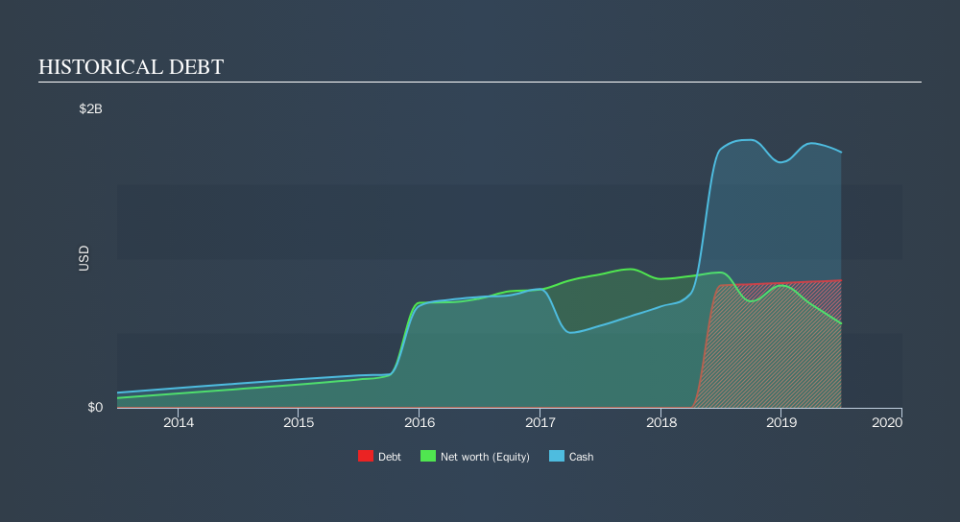Atlassian (NASDAQ:TEAM) Has Debt But No Earnings; Should You Worry?

Howard Marks put it nicely when he said that, rather than worrying about share price volatility, 'The possibility of permanent loss is the risk I worry about... and every practical investor I know worries about. It's only natural to consider a company's balance sheet when you examine how risky it is, since debt is often involved when a business collapses. We note that Atlassian Corporation Plc (NASDAQ:TEAM) does have debt on its balance sheet. But the more important question is: how much risk is that debt creating?
Why Does Debt Bring Risk?
Debt is a tool to help businesses grow, but if a business is incapable of paying off its lenders, then it exists at their mercy. Ultimately, if the company can't fulfill its legal obligations to repay debt, shareholders could walk away with nothing. However, a more frequent (but still costly) occurrence is where a company must issue shares at bargain-basement prices, permanently diluting shareholders, just to shore up its balance sheet. Of course, debt can be an important tool in businesses, particularly capital heavy businesses. The first step when considering a company's debt levels is to consider its cash and debt together.
Check out our latest analysis for Atlassian
What Is Atlassian's Debt?
As you can see below, at the end of June 2019, Atlassian had US$853.6m of debt, up from US$819.6m a year ago. Click the image for more detail. However, it does have US$1.71b in cash offsetting this, leading to net cash of US$859.9m.
How Strong Is Atlassian's Balance Sheet?
According to the last reported balance sheet, Atlassian had liabilities of US$2.33b due within 12 months, and liabilities of US$82.1m due beyond 12 months. Offsetting these obligations, it had cash of US$1.71b as well as receivables valued at US$88.3m due within 12 months. So it has liabilities totalling US$610.0m more than its cash and near-term receivables, combined.
Of course, Atlassian has a titanic market capitalization of US$30.2b, so these liabilities are probably manageable. Having said that, it's clear that we should continue to monitor its balance sheet, lest it change for the worse. While it does have liabilities worth noting, Atlassian also has more cash than debt, so we're pretty confident it can manage its debt safely. There's no doubt that we learn most about debt from the balance sheet. But it is future earnings, more than anything, that will determine Atlassian's ability to maintain a healthy balance sheet going forward. So if you want to see what the professionals think, you might find this free report on analyst profit forecasts to be interesting.
In the last year Atlassian wasn't profitable at an EBIT level, but managed to grow its revenue by37%, to US$1.2b. With any luck the company will be able to grow its way to profitability.
So How Risky Is Atlassian?
While Atlassian lost money on an earnings before interest and tax (EBIT) level, it actually generated positive free cash flow US$420m. So taking that on face value, and considering the net cash situation, we don't think that the stock is too risky in the near term. One positive is that Atlassian is growing revenue apace, which makes it easier to sell a growth story and raise capital if need be. But that doesn't change our opinion that the stock is risky. For riskier companies like Atlassian I always like to keep an eye on the long term profit and revenue trends. Fortunately, you can click to see our interactive graph of its profit, revenue, and operating cashflow.
If, after all that, you're more interested in a fast growing company with a rock-solid balance sheet, then check out our list of net cash growth stocks without delay.
We aim to bring you long-term focused research analysis driven by fundamental data. Note that our analysis may not factor in the latest price-sensitive company announcements or qualitative material.
If you spot an error that warrants correction, please contact the editor at editorial-team@simplywallst.com. This article by Simply Wall St is general in nature. It does not constitute a recommendation to buy or sell any stock, and does not take account of your objectives, or your financial situation. Simply Wall St has no position in the stocks mentioned. Thank you for reading.

 Yahoo Finance
Yahoo Finance 
